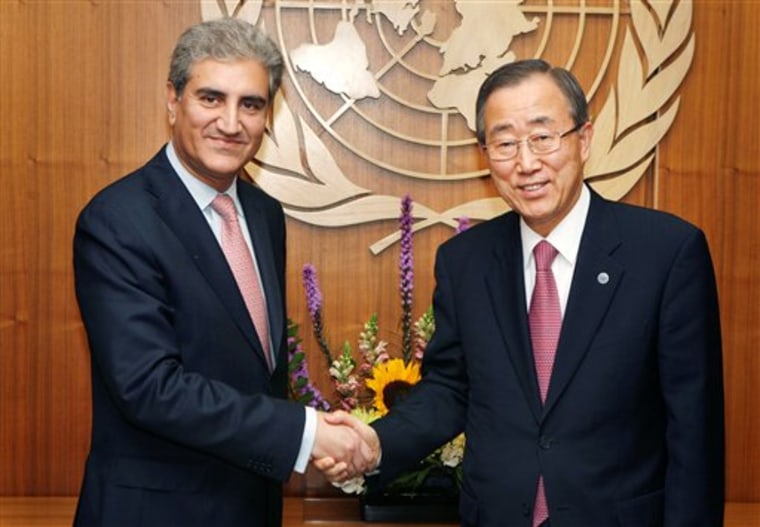The U.N. chief has agreed to Pakistan's request to establish an independent commission that will investigate the killing of former Prime Minister Benazir Bhutto.
U.N. Secretary-General Ban Ki-moon's office confirmed the agreement moments after it was announced by Pakistan's top diplomat.
"The objectives are for the commission to identify the culprits, perpetrators, organizers and financiers of the assassination," Pakistan Foreign Minister Shah Mahmood Qureshi told reporters Thursday, just after a brief, private meeting with Ban.
Determining who was behind Bhutto's killing could help stabilize a nation that is a key U.S. ally in the fight against terrorism, but has been struggling against an influx of insurgents joining with al-Qaida and other militant groups in Pakistan's remote tribal and mountainous areas.
Suspicions cast far and wide
The previous government blamed the Taliban in Pakistan for the attack against Bhutto, but suspicions surrounding her death have been cast far and wide — a further reason for the government's pressing to clear up the matter. Qureshi assured reporters that Ban would appoint "well-respected, eminent people" to the independent commission.
"We have reached an understanding, and there is a concrete decision on that," the foreign minister said. "What is being discussed and further consultations are required are on the modalities."
Ban's office said in a statement that "broad understanding had been reached" on the nature of the commission, including: how to pay for it; who its members should be; how to protect its independence and impartiality; and that its members should have unfettered access to the information it needs.
But Ban said he would have to talk further with Pakistan and other U.N. officials to hammer out all the details.
Qureshi said he believed Ban had authority without the U.N. Security Council's approval to set up a commission to try to identify the culprits in Bhutto's assassination as quickly as possible. But Qureshi also said some council members he spoke with were supportive of establishing a commission.
"The broad understanding is going to be that it should be done in the shortest possible time, so that we do not want it sort of a lingering thing, going on for years," Qureshi said.
Death shocked the world
Bhutto died in a gun and suicide bomb attack on Dec. 27 as she left an election rally in the city of Rawalpindi.
Her death shocked the world and Pakistan, fanning revulsion at rising militant violence and theories that Pakistan's powerful spy agencies were involved.
It also helped carry her Pakistan People's Party to victory in February elections. The party has led a fledgling coalition government that has made a U.N. probe into who was behind the killing a top priority.
Qureshi said Pakistan will provide the panel with "unhindered access to sources of relevant information."
The previous government and the CIA quickly accused Baitullah Mehsud, the top Taliban commander in Pakistan, of orchestrating the killing.
Pakistan's Interior Ministry released a wiretap in which Mehsud associates purportedly congratulated each other for her death. Bhutto had called for Pakistan to redouble its efforts against Islamic extremism.
Bhutto's party has argued that the United Nations should probe the killing, given Mehsud's alleged links to al-Qaida and because of the huge political controversy that surrounds the case in Pakistan.
